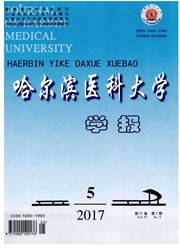

 中文摘要:
中文摘要:
目的评估氩氦刀治疗不适合再次手术切除结直肠癌肝转移患者的临床获益。方法68例患者随机分为A、B两组,比较应用氩氦刀组(A组)与未用组(B组)在2年生存率、瘤负荷减小和生活质量等方面的差别。结果用氩氦刀组与未用组相比两年生存率分别为71.88%和51.61%,血清CEA降至正常分别为57.14%和22.22%,病灶坏死或缩小分别为62.5%和22.6%,差异均有显著意义(P值分别为0.048、0.049和0.002)。结论氩氦刀治疗大肠癌肝转移瘤是一种微创、相对安全、疗效可靠的新方法,对于失去外科手术治疗机会的晚期结直肠癌肝转移患者氩氦刀联合化疗是一种有效的综合治疗模式。
 英文摘要:
英文摘要:
Objective To assess the clinical benefit of cryosurgery for patients with colorectal liver metastases who were not suitable for re-resection. Methods Six-eight patients with liver metastases following surgical resection of colorectal cancer were divided into Group A( with cry- osurgery) and Group B(without cryosurgery). The differences of 2-year survival, reduction of tumor load, and quality of life between two groups were compared. Results The 2-year sur- vival rate, Changes in serum CEA value and necrosis or volume reduction of lesion for group A and group B were 71.88% vs 51.61%, 57.14% vs 22.22%, and 62.5% vs 22.6%, re- spectively. The difference was significant, and P values were 0. 048, 0. 049, and 0. 002, re- spectively. Conclusion Cryosurgery is a new reliable minimally-invasive and relatively-safe method for treating colorectal liver metastases. As for patients with liver metastases of advanced colorectal cancer who have no chances of surgery, cryosurgery in combination with chemothera-py is an effective, comprehensive treatment modality.
 同期刊论文项目
同期刊论文项目
 同项目期刊论文
同项目期刊论文
 Analyzing large-scale samples confirms the association between rs16892766 polymorphism and colorecta
Analyzing large-scale samples confirms the association between rs16892766 polymorphism and colorecta Expression of phosphorylated Stat5 predicts expression of cyclin D1 and correlates with poor prognos
Expression of phosphorylated Stat5 predicts expression of cyclin D1 and correlates with poor prognos Naringenin decreases invasiveness and metastasis by inhibiting TGF-beta-induced epithelial to mesenc
Naringenin decreases invasiveness and metastasis by inhibiting TGF-beta-induced epithelial to mesenc LincRNA-p21 enhances the sensitivity of radiotherapy for human colorectal cancer by targeting the Wn
LincRNA-p21 enhances the sensitivity of radiotherapy for human colorectal cancer by targeting the Wn TNFAIP8 overexpression is associated with lymph node metastasis and poor prognosis in intestinal-typ
TNFAIP8 overexpression is associated with lymph node metastasis and poor prognosis in intestinal-typ ETV1 induces epithelial to mesenchymal transition in human gastric cancer cells through the upregula
ETV1 induces epithelial to mesenchymal transition in human gastric cancer cells through the upregula Activation of Vitamin D Receptor Signaling Down regulates FOXM1 Expression and Suppresses Pancreatic
Activation of Vitamin D Receptor Signaling Down regulates FOXM1 Expression and Suppresses Pancreatic Prostaglandin E2 receptor 1 activity regulates cell survival following hypoxia in cultured rat corti
Prostaglandin E2 receptor 1 activity regulates cell survival following hypoxia in cultured rat corti Increased number of forkhead box P3+ tumor-infiltrating lymphocytes correlates with high preoperativ
Increased number of forkhead box P3+ tumor-infiltrating lymphocytes correlates with high preoperativ Comparison of percutaneous cryosurgery and surgical resection for the treatment of small hepatocellu
Comparison of percutaneous cryosurgery and surgical resection for the treatment of small hepatocellu 期刊信息
期刊信息
